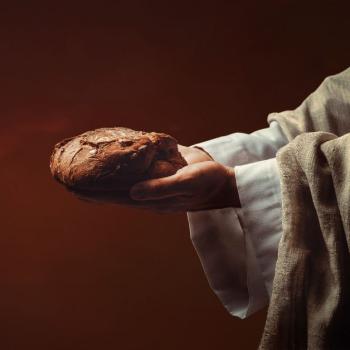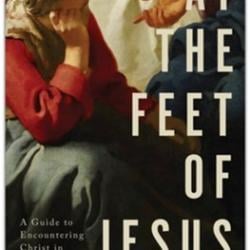The LORD is close to the brokenhearted and saves those who are crushed in spirit. The righteous person may have many troubles, but the LORD delivers him from them all . . . ~ Psalm 34:18-19
Last week I talked about encouraging a heroic mindset in children and how it relates to our biblical role models, faith, and the humble acceptance of suffering. This week, I'd like to apply some similar themes to working with teenagers, who are beginning to experience the inevitable sufferings of life in all their overwhelming intensity.
By the seventh grade, teens really need a basic understanding of Salvation History, so it's very important that they be comfortable with their Bibles. These true stories of faith demonstrate some of the myriad ways God brings good out of suffering, a priceless insight for teens, who are often forced to deal with divorce, social problems, poverty, and other issues that stress and perplex them. Much of what we practice and believe as Catholics is prefigured in the Old Testament and fulfilled in the New Testament. Familiarity with these texts gives depth to their appreciation for the Mass, the priesthood, our devotion to Mary, and so much more, strengthening and encouraging them as they grow in wisdom, and arming them to defend the Faith.
Biblical heroes can be great role models for young people, but we have to be sure to give them an honest picture of these very human holy men and women. Young people assume at first that they will never "measure up" to biblical persons, but the Bible shows that, like all of us, the people of Israel failed again and again, and God healed and renewed them again and again. He also made a point of using the weak to do some of His greatest works. Moses had a speech impediment and begged God to send someone else to free the Israelites from slavery (Ex. 4:10-16)! Jonah tried to hide from God (Jon. 1)! Saint Peter denied Christ three times (Mk. 14:66-72)! Sometimes when teens read the Bible they are scandalized by the behavior of biblical characters. But their foibles teach us that God brings good even from our mistakes. Our God is a God of second chances—and third, and fourth, and so on. We should never despair of ourselves with a God so good watching over our lives.
Never forget that teaching the Faith is always, at its foundation, a supernatural experience. The Bible is the living Word of God and can be very stimulating for young people who are not normally interested in religion. After hearing scripture read aloud, teens ask great questions, like: "Why didn't God just destroy the devil?" or "How do we know any of this is even true?"
They're tough questions, but don't make the mistake of trying to avoid answering them. They're asking sincerely, if not diplomatically. There are excellent resources available and you can always say, "Great question. Thanks for asking. I'm going to hit the Catechism and get back to you on that next week!" There are many trustworthy websites and Church documents available free online, including the Catechism of the Catholic Church, and it is packed with solid answers to questions such as these. Make sure to follow through. This shows respect for the child's curiosity while modeling the virtue of humility, and demonstrates that the Church can be trusted to provide answers.
Familiarity with the Bible reinforces the truths of our faith in many ways, including:
- The singular fact that Jesus Christ is the only person in all of human history to have been foretold. His coming was announced hundreds of times (see here for a selection of examples)in Old Testament prophecies, the details of which were fulfilled in His conception, life, and death (i.e., Isaiah 53).
- Many remarkable details of His life are also matters of historical record based on various first century writers, including the Gospel accounts and the writings of a well-regarded historian, Flavius Josephus. There is no reason to doubt Jesus Christ existed.
- As for whether He was divine as He claimed? Logically, if He was not divine He was either a con man or insane. But would a con man live a life of service and go meekly to a solitary death? And if self-obsession is a hallmark of insanity, would a mentally-ill person spend all his time teaching and healing, stunning local leaders with his authority and wisdom while sounding a radical call to love of neighbor and reconciliation with God?
- Catholic author and historian, George Sim Johnston says that catechists can avoid teaching many common errors by reading the Gospels and learning what Jesus actually said and did. He says, for instance, "Some teachers tell their students that there is no hell. But Jesus refers to it five times in the Sermon on the Mount alone." Johnston also observes that Pope John Paul II called hell the "final guarantor of our freedom"!
- For questions on papal infallibility, the Inquisition, Marian devotion, and other hot-button issues, see Karl Keating's charitable refutation of some of the many myths levied against the Catholic Church: Catholicism and Fundamentalism: The Attack on "Romanism" by "Bible Christians" (published by Ignatius Press).
- My favorite new resource is the "YOUCAT: The Youth Catechism of the Catholic Church," also available from Ignatius Press. Right now it's on sale for about $17. Grab up several for all the teens in your life. It's a beauty. Laid out in Q&A format with wonderful quotes in the margins, charming illustrations, beautiful artwork, and lots of scriptural references, this bright yellow paperback is so appealing that the first time I showed my 11-year-old how to find interesting topics via the index, she pulled it out of my hands and commandeered it for her own reading pleasure.
- For teaching teens to love Sacred Scripture, I can't recommend highly enough one of the columnists at my catechetical website, Amazing Catechists. Christian LeBlanc teaches middle school kids living in the Bible belt how to find the roots of our faith in the Old Testament, and the fulfillment of it in the New Testament, through quirky, high-energy presentations that keep them on their toes and totally engaged. You can also listen to one of his classes at his blog.
- Another wonderful catechist, blogger Dorian Speed, who teaches Sacred Scripture to teens, recommends the following resources for answering tough questions and opening the Word of God to young people:
- Questions from Seventh Period: Doc Pennock Answers Teens' Questions on Life, Love & the Catholic Faith, by Michael Francis Pennock, PhD
- Did Adam and Eve Have Belly Buttons? Jason Evert & Matt Pinto
- Did Jesus Have a Last Name? Jason Evert & Matt Pinto
- Prove It! God, by Amy Welborn
- Prove It! Jesus, by Amy Welborn
- Prove It! Church, by Amy Welborn
- United States Catholic Catechism for Adults (plain language, very good for High School use)
- The How-To Book of the Mass: Everything You Need to Know but No One Ever Taught You, by Michael Dubruiel
- Making Senses Out of Scripture: Reading the Bible As the First Christians Did, by Mark P. Shea
- The Teen Timeline, T3 Study Kit (Great Adventure), by Mark Hart and Jeff Cavins
- Swimming with Scapulars: True Confessions of a Young Catholic (memoir), by Matthew Lickona
- Old Testament Figures in Art, Getty's Guide to Imagery Series
- Saints in Art, Getty's Guide to Imagery Series
Please add your own favorite resources, teaching tips, questions, or anecdotes below in the comments section. God bless you!
5/3/2011 4:00:00 AM





